The Best Home Emergency Generator For Hurricane Season
This is expected to be one of the worst hurricane season in recorded history. As hurricane season approaches, the importance of being prepared cannot be overstated. One of the most critical components of any emergency preparedness plan is having a reliable home emergency generator.
When the power goes out due to severe weather conditions, a generator can keep your household running smoothly and ensure your family’s safety and comfort. In this blog post, we’ll explore why you need an emergency generator and how it can help you during a hurricane or any other power outage.
Why You Need an Emergency Generator
1. Power Outages Are Unpredictable
Power outages can happen without warning, especially during hurricanes, severe storms, or other natural disasters. When the grid goes down, you could be left without electricity for hours, days, or even weeks. An emergency generator ensures that you have a backup power source to keep essential appliances and devices running.
2. Safety and Comfort
Without power, your home can quickly become uncomfortable and unsafe. Here’s how a generator can help:
Lighting: Keeps your home illuminated, reducing the risk of accidents and providing a sense of security.
Heating and Cooling: Maintains the temperature inside your home, preventing heatstroke in summer and hypothermia in winter.
Refrigeration: Keeps your food fresh and safe to eat, reducing the risk of foodborne illnesses.
Medical Equipment: Powers essential medical devices, ensuring that those who rely on them remain safe.
3. Communication and Information
During a power outage, staying informed about the weather and emergency services is crucial. A generator can power:
Phones and Chargers: Ensures you can stay in contact with loved ones and emergency services.
Radios: Allows you to receive important updates and instructions.
Internet Routers: Keeps you connected to online resources and news.
Benefits of Having an Emergency Generator
1. Peace of Mind
Knowing you have a reliable backup power source can significantly reduce stress during a hurricane or other emergencies. You can focus on keeping your family safe and comfortable rather than worrying about the power situation.
2. Financial Savings
Power outages can lead to costly damages and losses. A generator can help prevent:
Spoiled Food: Keeps your refrigerator and freezer running, saving you from throwing away spoiled groceries.
Property Damage: Powers sump pumps to prevent flooding and keeps security systems operational.
Hotel Expenses: Allows you to stay in your home rather than paying for a hotel.
3. Increased Property Value
Having a home emergency generator can increase your property’s value. Prospective buyers see it as a valuable asset, knowing they’ll be prepared for any power outages.
Choosing the Best Home Emergency Generator
When selecting a home emergency generator, consider the following factors:
1. Power Needs
Determine how much power you need by listing all the appliances and devices you want to keep running during an outage. Common items include:
Refrigerator
Freezer
Lights
HVAC system
Sump pump
Medical equipment
Computers and chargers
Use this checklist to calculate your total power requirements. Most appliances have a label indicating their wattage, making it easier to add up the total.
2. Type of Generator
There are two main types of generators: portable and standby.
Portable Generators: These are versatile and can be moved around as needed. They are generally less expensive but require manual setup and fueling.
Standby Generators: These are permanently installed and automatically turn on when the power goes out. They are more expensive but provide seamless and reliable power.
3. Fuel Type
Generators can run on different types of fuel, including gasoline, propane, and diesel. Consider the availability and storage of fuel in your area:
Gasoline: Widely available but has a shorter shelf life.
Propane: Has a longer shelf life and is cleaner burning but requires storage space for tanks.
Diesel: Efficient and long-lasting but may be harder to find during emergencies.
4. Noise Level
Generators can be noisy, which may be a concern, especially in residential areas. Look for models that are designed to operate quietly.
5. Additional Features
Some generators come with extra features that can be very useful:
Electric Start: Easier to start, especially for those who may have difficulty with pull-start mechanisms.
Remote Monitoring: Allows you to check the generator’s status from your phone or computer.
Multiple Outlets: Provides flexibility in connecting various appliances.
Recommended Home Emergency Generators
Here are some of the top-rated generators that are perfect for home emergency use:
1. Honda EU2200i
Power Output: 2200 watts
Fuel Type: Gasoline
Features: Quiet operation, lightweight, reliable
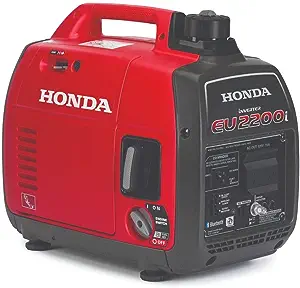
2. Champion 100891 9375/7500-Watt Dual Fuel Portable Generator
Power Output: 7500 watts
Fuel Type: Gasoline and propane
Features: Dual fuel capability, electric start
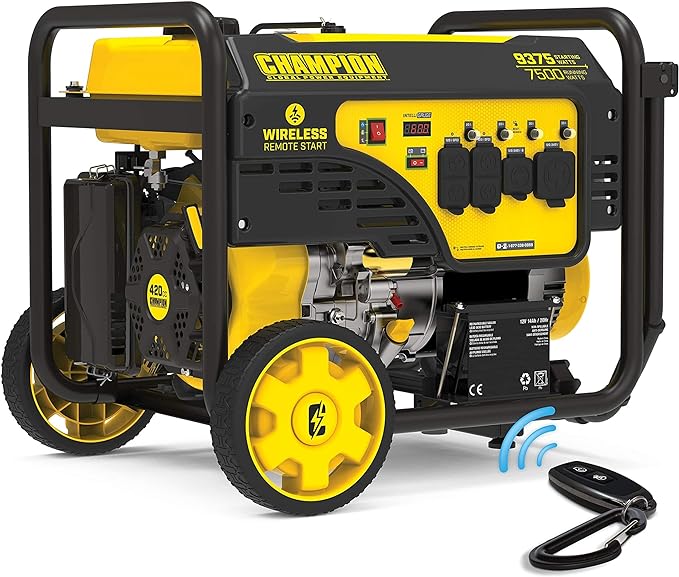
3. Westinghouse WGen7500
Power Output: 7500 watts
Fuel Type: Gasoline
Features: Remote start, transfer switch ready
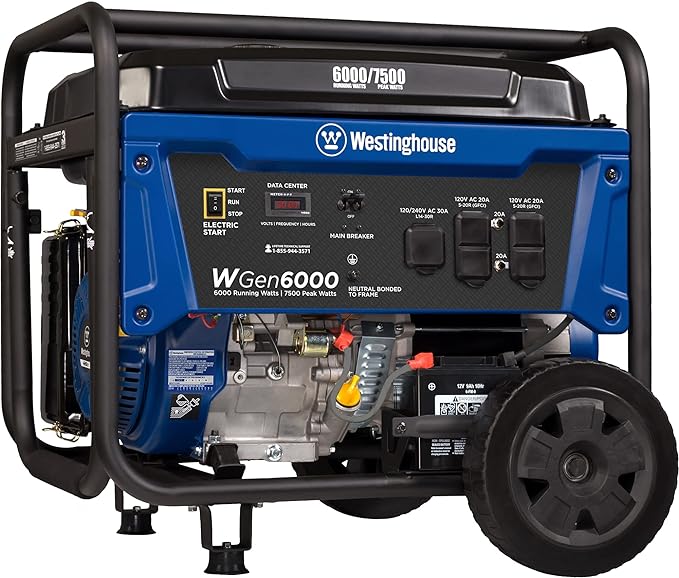
4. Generac 8250 GP2500i
Power Output: 2500 watts
Fuel Type: Gasoline
Features: Compact, quiet, easy to transport, fuel efficient
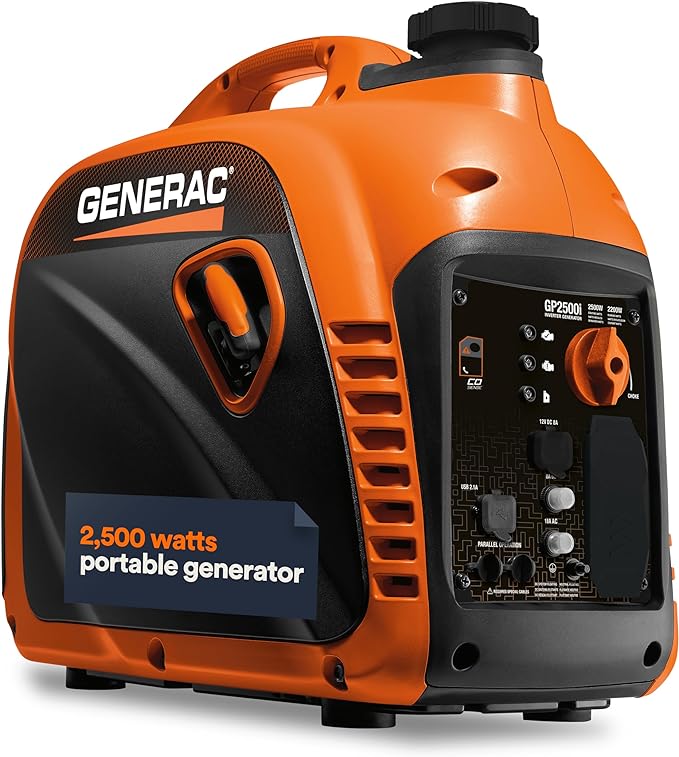
5. DuroMax XP12000EH
Power Output: 12000 watts
Fuel Type: Gasoline and propane
Features: Dual fuel, high power output
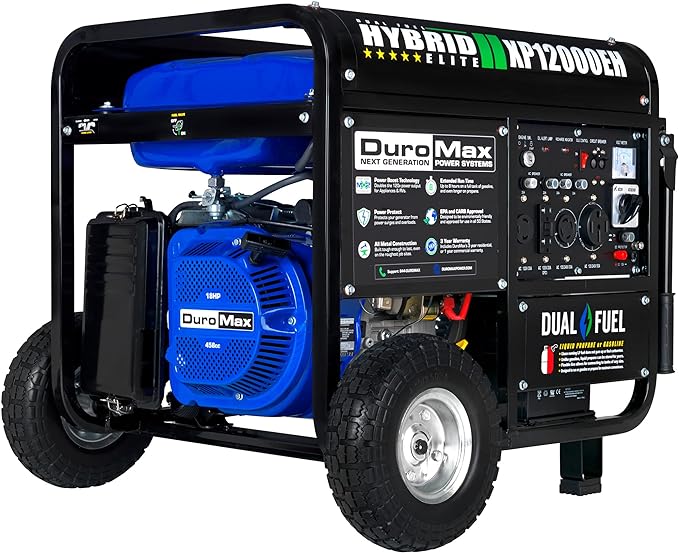
How to Prepare for a Hurricane with Your Generator
Having a generator is just one part of being prepared for a hurricane. Here’s a checklist to ensure you’re fully ready:
1. Before the Hurricane
Purchase and Test Your Generator: Make sure it’s in good working order.
Stock Up on Fuel: Have enough fuel on hand to last several days.
Gather Extension Cords and Power Strips: Ensure they are rated for the generator’s output.
Create a Power Management Plan: Decide which appliances and devices you will power.
2. During the Hurricane
Place the Generator Outside: Ensure it is in a well-ventilated area, away from windows and doors.
Start the Generator: Follow the manufacturer’s instructions.
Monitor Fuel Levels: Refill as necessary, taking safety precautions.
3. After the Hurricane
Perform Maintenance: Check oil levels, clean air filters, and inspect for any damage.
Store Safely: Ensure the generator is stored in a safe, dry place until the next use.
Conclusion
Investing in the best home emergency generator is a wise decision, especially during hurricane season. It provides peace of mind, safety, and comfort for you and your family during power outages. By considering your power needs, the type of generator, and other key factors, you can select the perfect generator to keep your home running smoothly during an emergency.
Stay safe and prepared this hurricane season and beyond!


